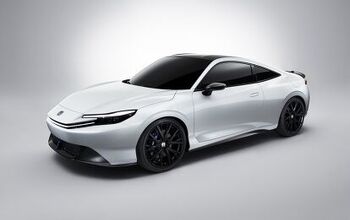Daily Podcast: CAFE Culture
The list of CAFE violators ( in PDF form) reads like a valet’s to-do list: Mercedes, Porsche, Ferrari, Maserati. These firms pay CAFE fines because, well, they can. CAFE fines are calculated by multiplying each tenth of a mile per gallon of average non-compliance by $5.50, then multiplying that dollar amount by the number of vehicles sold. As a result, luxury firms pay the highest fines when they try to go mass market: Merecedes paid about $30 million for 2007. But if CAFE is already weighted to let small companies off the hook, why are we hearing about new rules which seem to relax standards for firms selling fewer than 400k vehicles per term? Aren’t the regular loopholes enough?
The answer takes a little digging to find, but it explains everything. Proposed rules for the 2011-2015 standard ( PDF) reveal that
EPCA authorizes increasing the civil penalty up to $10.00, exclusive of inflationary adjustments, if NHTSA decides that the increase in the penalty—
(i) will result in, or substantially further, substantial energy
Doubling the CAFE fine would force the small firms to finally get serious about efficiency . . . unless there were a loophole. Hence the loophole.
Of course, that’s not going to be enough come the day when greenhouse gasses become a regulated pollutant under the Clean Air Act. As proposed rules for CAFE/GHG coordination explain:
failure to meet the standards after credit opportunities are exhausted would ultimately result in the potential for penalties under [Energy Policy and Conservation Act] (CAFE), and under the [Clean Air Act] as well. The CAA allows considerable discretion in assessment of penalties. Penalties under the CAA are typically determined on a vehicle-specific basis by determining the number of a manufacturer’s highest emitting vehicles that caused the fleet average standard violation. This is the same mechanism used for EPA’s National LEV and Tier 2 corporate average standards, and to date there have been no instances of noncompliance.
In short, fines are going to double, and the risk of a Clean Air Act violation lawsuit means non-compliant firms face double jeopardy.
More by Edward Niedermeyer
Latest Car Reviews
Read moreLatest Product Reviews
Read moreRecent Comments
- Rochester I'd rather have a slow-as-mud Plymouth Prowler than this thing. At least the Prowler looked cool.
- Kcflyer Don't understand the appeal of this engine combo at all.
- Dave M. This and the HHR were GM's "retro" failures. Not sure what they were smoking....
- Kcflyer Sorry to see it go. The interior design and color options in particular are rare in the industry
- Wolfwagen Here is my stable. not great not bad I try to do as much as possible. I work for an Aftermarket automotive parts company so I can get most parts at a discount.i try to do as much of my own work as possible. My wife hates that I spend time and money fixing the vehicles but she doesn't want car payments either so...2019 VW Atlas 50K (wife's) Only issues so far were Brakes and normal maintenance.A Bad Cat Converter which was covered and a replacement of the rear bank head gasket which was a manufacturing defect due to improper torquing at the factory. All under warranty2003 Saab 9-5 Arc Wagon (my DD) 116 K picked up used last year. Replaced Struts, brakes, hatch struts, motor mounts, D/S swaybar link, Timing belt, water pump and thermostat Power steering pump Fuel pump, Both Front window regular rollers, Heater core and cabin air filter. Oil and transmission changes. Love the car but Saab/GM packaging is a nightmare.2005 Cadillac Deville (former DD now Son # 1 DD) picked up used 5 years ago with only 47K now 83K Plugs, coils, P/s pump, Water pump, hoses, P/S lines (mechanic job) evap valve, brakes, Front brake calipers and rear brake calipers. Currently has oil pan gasket leak - looking to have a mechanic do that2009 Mini Cooper (Daughters dd)picked up 2 years ago 67K Brakes and thermostat house to clear check engine light2001 Mazda Tribue (Son#2 dd) 106K picked last summer after he severely damaged a 2004 Hyundai accent. Oil changes


































Comments
Join the conversation
Like we've said before, this an exceptionally complex way of getting the same thing you can get out of a simple gas tax.
Correct, dean, and under this law the bureaucracy has the "discretion" to be judge, jury and executioner.